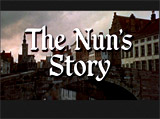
|
The Nun's Story (1959)
In director Fred Zinnemann's religious drama about
a Belgian woman who entered a convent and later served in the Belgian
Congo in Africa:
- in the late 1920s in Bruges, Brussels, the headstrong
and stubborn-minded Gabrielle "Gaby" Van der Mal (Audrey
Hepburn) was walked to a convent (of nursing sisters) by her eminent
surgeon-father Dr. Van der Mal (Dean Jagger) to enter as a postulant
- to be 'married' to the church and serve as a medical nurse (hopefully
in the Congo); he cautioned and advised:
"Gaby, I can see you poor, I can see you chaste. But I cannot
see you, a strong-willed girl, obedient to those bells....You may
never get to the Congo. You certainly can never ask for it. You know
that, don't you? Your personal wishes cease to exist when you enter
that door"; when he said goodbye to his daughter, he also told
her: "Remember, if you ever decide this is not right for you,
there is no sense of failure in coming back home"; as she was
about to be led away, she promised her father: "I'll do my best.
I want you to be proud of me"
- the strict and self-sacrificing rules of the convent,
including "exercises in humility" and a rigid schedule
(early morning rising, chapel, meals, and a period of 'Grand Silence'),
and a reporting in a notebook "each and every imperfection against
the Holy Rule" with the words: "I accuse myself..." -
causing a challenge for the strong-willed Gaby for a six month period
as a postulant
- the sequence of Gaby's Day of Vesture, when she was
given a name (Sister Luke) and the novice's habit; however, when
told she would make "a beautiful nun", she blushed (a violation
of the rules and an exhibition of the sin of pride) - and she discussed
her discomfort with a fellow novice, thereby breaking the rule of
Silence
- during her training at medical school in Antwerp about
tropical diseases (such as malaria), Dr. Goodvaerts (Lionel Jeffries)
told the Sister students: "I, too, have lost some of my quickness,
my memory from too much Congo sun. Too much quinine. If any of you
think that the Congo that you'll find today in 1930 is anything like
the Congo that we found when we went there 20 years ago, you will
be mistaken"; he complimented Sister Luke's skills with a microscope,
causing some competitive jealousy among the others: "She was
brought up looking through a microscope, you know, whilst most of
you were playing with kaleidoscopes"
- instead of being sent to the Congo (her greatest wish,
although denied because she wasn't "perfected in the religious
life" and still needed to learn "obedience"), her
placement in a European mental hospital/sanitarium near Brussels,
where an assault on Sister Luke occurred by a dangerous schizophrenic
patient named "Archangel Gabriel" (Colleen Dewhurst) after
being tricked into unlocking her cell for a glass of water; Sister
Luke was pulled into the cell, thrown to the floor and attacked
|
"Archangel Gabriel"
|

|

|
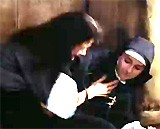
|
|
Dangerous Schizophrenic Patient
|
Thrown Onto Floor of Cell
|
Attacked
|
- her work in the Belgian Congo in a segregated hospital
for 'white' and European patients (not natives), with the brilliant,
atheistic ("an unbeliever") and demanding surgeon Dr.
Fortunati (Peter Finch), a bachelor who was described by Mother
Mathilde (Dame Peggy Ashcroft) as "a genius and a devil";
when she finally met him, he realized she had problems with "the
display of pride" when she bragged about assisting her father
in operations in the past
- Sister Luke's diagnosis tuberculosis - when Dr. Fortunati
confirmed her suspicions and fears, that she might have to return
to Europe ("You're afraid you won't be able to stand the convent
if they send you back"); he told Sister Luke that she was a "worldly
nun" who was good for patients, but who could never conform
to the convent's expectations: "I've never worked with any other
kind of nurse except nuns since I began. And you're not in the mold,
Sister. You never will be. You're what's called a worldly nun. ldeal
for the public, ideal for the patients. But you see things your own
way. You stick to your own ideas. You'll never be the kind of nun
that your convent expects you to be. That's your illness. The TB
is a by-product. I can cure the by-product, if you want me to"; she
told him: "I want to stay"; but over time, he realized
that Sister Luke's anxiety and tension were mostly due to her inner
spiritual struggle: "I'd say that tension is a sign of an exhausting
inner struggle"
- the scene of the Belgian Congo native, after contact
with a superstitious witch doctor, who attacked and struck to death
(with a club) a nun who had invited unconverted natives to attend
Christmas Eve service; the native was wrestled to the ground and
subdued; it was learned that "a witch doctor told him that if
he killed a white woman, he'd be rid of the ghost of his dead wife"
- in the conclusion, Sister Luke returned to Belgium,
where the onset of WWII, made it impossible for her to return to
the Congo; she admitted that she could not forgive the Nazi Germans
after she received a letter about the death of her father; she was
devastated - "When I think of my father, I can't forgive the
enemy"
and she was "filled with hate"
|
Turning Point: News of the Death of Her Father
|
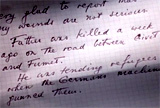
|

|
- Sister Luke began to believe that she should leave
the nunhood: "I simply cannot obey, and if I cannot obey,
then"
- and she affirmed: "I think I've been struggling all these
years, Reverend Mother. In the beginning, each struggle seemed different
from the one before it. But then they began to repeat and I saw they
all had the same core: obedience without question, without inner
murmuring. Perfect obedience as Christ practiced it, as I no longer
can"
- the ending sequence of Sister Luke's dispensation
(or exemption) from her vows in Brussels, Belgium as she signed three
sets of duplicate papers, received back her father's dowry, and was
voluntarily released from all her vows (she was asked: "Sister,
have you really considered the seriousness of what you're doing?" -
and replied affirmatively); she was instructed: "Go through
here to Room 12. Everything is ready. Press the button when you are
finished and I will open"
- and the final silent fadeout as she removed her nun's
habit in Room 12 and the ring on her finger, pressed the exit button,
and slowly walked away from the convent out into the sunlit cobblestone
street, totally alone and without her nun's habit for the first time
in many years; she became a lone figure in the distance, then turned
to the right out of camera view, as bells pealed and "THE END" was
superimposed
|
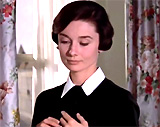
Young Belgian Gabrielle Van der Mal (Audrey Hepburn)
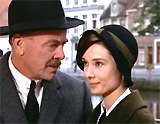
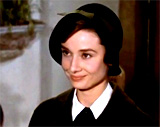
Gaby with Her Father - Brought to Convent to Enter as
Postulant Nurse
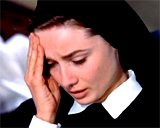
Struggling With the Rules of the Order, and "Maturity
in the Religious Life"
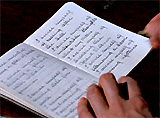
Her Notebook: "I Accuse Myself..."
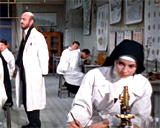
Tropical Disease Medical Training in Antwerp

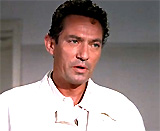
In the Congo Hospital, Meeting Dr. Fortunati (Peter
Finch)
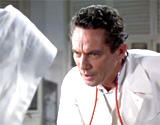
Diagnosis of TB and the Doctor's Statement: "You're
not in the mold, Sister"
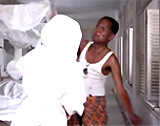

Congo Native Attack on One of the Nuns
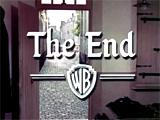
"THE END"
|













